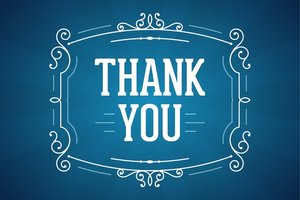By Jennifer Post
Business News Daily, July 2, 2018 —
Saying thank you is a small task that can yield big results, especially if it comes after a job interview. Sending a thank-you note within 24 hours of your interview could mean the difference between an offer and a rejection, according to a recent TopResume survey.
“The interview doesn’t end when you walk out the door,” said Amanda Augustine, career advice expert for TopResume. “The actions you take – or don’t take – after your job interview can have a major impact on the employer’s hiring decision.”
Why send a thank-you note?
If an employer has two equally qualified candidates, the offer will always go to the person who took the time to send a thank-you note, said Augustine.
“Sending the note sets you apart from the others,” she said. “It shows the employer that you’re polite, that you can follow through, and that you’re truly interested in the role. Also, your note will demonstrate to the employer how well you can write and convey your thoughts in a short amount of space – a skill that is highly valued in myriad roles.”
When should you send a thank-you note?
“Timing is everything,” Augustine said. “If you send the thank you right away, your interviewer will either assume you’re sending a generic template that didn’t require much thought or that you’re desperately eager for the job – both of which can be turnoffs to employers.”

Credit: Vasya Kobelev/Shutterstock
What should be in the note?
Augustine noted that there are several key points you should hit in your thank-you note:
- Thank the person for their time.
- Reiterate your interest in the position, referencing specific aspects of the role and/or company that genuinely resonate with you.
- Mention something you liked about the interview.
- Highlight your main qualifications for the position – without reciting your entire resume – and your confidence in your ability to do the job well. Focus on the qualifications that most interested the interviewer.
- Address any concerns the person expressed about your candidacy.
- Incorporate little details you learned about the interviewer during small talk to personalize your message and remind the person of the rapport you built with one another.
Ask yourself these questions: Did the interviewer(s) enjoy the conversation? Where did you connect with them? And what kind of interviewing style did they have (warm and friendly versus strictly business)? As with your resume and cover letter, it is best to customize the thank you, and double- and triple-check it for grammatical and spelling errors. A typo-filled follow-up can easily ruin the stellar impression you made during the interview. If you met with multiple people, be sure to send one note to each person if you have their contact information.
One important thing to remember is to not write your thank-you note like a novel. It should get your point across, but not be so wordy that the interviewer doesn’t read the whole thing.
“If you’re concerned your message is too long, consider how much would fit in a standard thank-you card you’d buy at a stationary store. If it wouldn’t fit there, reevaluate your message before you hit ‘send,’” Augustine said.
Handwritten vs. email
Augustine said that the format you choose for your thank-you message should be based on what you know about the company’s culture.
“If you interviewed with a tech startup, chances are, your interviewers will appreciate a paperless thank-you note in their inbox the next day,” Augustine said. “You also have the benefit of hyperlinking to additional information and attaching your resume to strengthen your message and jog the interviewers’ memory.”
Email is the most common form of thank-you note in today’s digital world, and the medium that most places prefer and expect. However, Augustine added that there are certain circumstances where a hand-written thank-you card may score you bonus points with the hiring manager.
“If you interviewed with an organization that has a traditional company culture, I recommend sending a snail-mail thank you, in addition to an email,” she said. “Not only will this cover your bases, but the handwritten note will arrive a couple of days after your email, helping to grab the hiring manger’s attention once again.”
Helpful tips
In an article for Live Career, Randall S. Hansen, the founder of Quintessential Careers, provided 10 tips for writing an effective post-interview thank-you letter.
- Write the note quickly – within 24 hours of your interview.
- Personalize each thank-you note to each interviewer you meet with.
- Be genuine and appreciative.
- Reinforce interest and enthusiasm in the position and company.
- Make sure to highlight your key selling points and why you’d be a good fit.
- Address weaknesses or misunderstandings that came up during the interview.
- If there was anything that was not discussed in the interview, but that you want to touch on, do it in the thank-you note.
- Keep it succinct.
- End the note with much thanks and gratitude for the opportunity.
- Make sure there are absolutely no typos, misspellings, etc. Proofread.
Sample thank-you note
Based on these tips, here’s an easy template to follow for sending a thank-you letter after an interview:
Good morning, [Interviewer’s Name]:
Thank you for taking the time to speak with me yesterday about the B2B staff writer position with Purch. It was a pleasure meeting with you, and I truly enjoyed learning more about the role and the company. After our conversation, I am confident that my skills and experiences are a great match for this opportunity.
I am very enthusiastic about the possibility of joining your team and would greatly appreciate a follow-up as you move forward with the hiring process. If you need any further information, please do not hesitate to contact me by email or phone. Thanks again, and I hope to hear from you in the near future.
Best regards,
[Your Name]
Additional reporting by Nicole Fallon.










